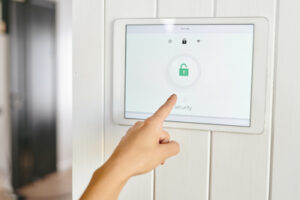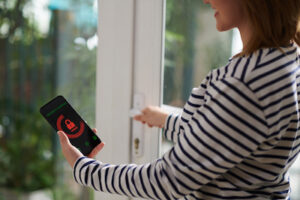Should You Install a Home Security System Yourself?
As a homeowner on a budget, I want to keep my home safe without spending an exorbitant amount of money. I realized that I might be able to save some money by installing a security system myself, but I decided to do some research first to make sure I wouldn’t regret it.
So, can I install a home security system myself? Yes, you can install a home security system yourself, but you need to make sure you understand the risks and challenges involved so that you don’t make a costly mistake.
When you’re deciding if you want to install a home security system yourself, there are a number of factors to think through.

Installing a Home Security System Yourself
There are some do-it-yourself home security system kits available that don’t require professional installation, but they usually have more limited features than a professionally installed system, and there are a few things you should know before you start.
First of all, if you’re not comfortable working with tools and wiring, then it’s probably not the best idea to try to install it yourself. Electric shock is no joke, and you could also create more problems for your home than you solve if you accidentally damage something.
Second, most home security companies will require you to sign a monitoring contract before they’ll activate your system. This means that even if you do install it yourself, you’ll still be paying for professional monitoring. It will still often save you money to install it yourself, but don’t think that the initial cost of the system is the only expense you’ll have to pay.
If you’re still interested in installing your own home security system, here are a few things you’ll need to do:
- Research the different types of security systems and find one that fits your needs and budget.
- Read the instructions carefully before you start so you know what you’re doing.
- Follow the instructions step-by-step to avoid any mistakes.
- Test your system once it’s installed to make sure it’s working properly.
Installing a home security system yourself can save you a lot of money, but it’s important to do your research and make sure you know what you’re doing before you start. Skipping steps or improperly installing the system could result in costly damage or void any warranty that came with the system. With a little bit of preparation, however, you can have a new security system up in your home.
The Pros and Cons of Installing a Home Security System Yourself
Now that you know a little bit more about installing a home security system yourself, let’s look at some of the pros and cons so you can make an informed decision.
The Pros
- You can save a lot of money by installing a home security system yourself. Professional installation can cost hundreds of dollars, while most do-it-yourself kits cost much less.
- You can customize the system to exactly fit your needs. You’re not limited to the features offered by the security company, and you can add any extra sensors or devices that you want.
- You’ll have more control over the placement of your equipment when you install it yourself. This is especially helpful if you have a unique layout or want to avoid drilling holes in your walls.

The Cons
- You’ll need to spend a significant amount of time installing and troubleshooting the system. This can be especially frustrating if you’re not comfortable working with tools and wiring.
- You might void the warranty on your equipment if you install it yourself. Most manufacturers require professional installation for the warranty to be valid.
- You could damage your home or injure yourself if you don’t know what you’re doing. This is probably the biggest con of installing a home security system yourself – it’s not worth risking your safety to save a few hundred dollars.
- You might accidentally leave a portion of your home vulnerable. A professional installer will know how to properly place sensors and cameras to fully secure your home, which means you’re less likely to have blind spots.
If you decide to install a home security system yourself, make sure you do your research and take your time. It’s not a project you want to rush through, and it’s definitely not worth risking your safety for. With a little bit of effort, however, you can have a great security system without spending a lot of money.
The Benefits of Installing a Home Security System
If you’re still on the fence about whether or not to install a home security system at all, here are a few benefits to keep in mind:
1. A home security system can deter burglars from targeting your home.
2. A home security system can give you peace of mind by knowing that your home is protected.
3. A home security system can help you save money on your homeowner’s insurance.
4. A home security system can provide you with a sense of security when you’re away from home.
5. A home security system can be customized to fit your specific needs.
6. A home security system can be installed quickly and easily.
7. A home security system can be monitored remotely.
8. A monitored home security system can give you peace of mind that help is on the way in the event of a fire, medical emergency, or break-in.
Monitored Vs. Unmonitored Home Security Systems
Monitored home security systems are connected to a central monitoring station through a landline, broadband, or cellular connection. The monitoring station is staffed 24/7 by professional security operators who will contact you and your local authorities in the event of an emergency.
When the system is triggered, an alarm will sound and the monitoring station will be notified. The operator will then call your home to verify that it’s a false alarm before dispatching the police. If they can’t reach you, they’ll assume it’s a real emergency and take appropriate action. Having monitored home security gives you the peace of mind that comes with knowing someone is always watching over your home.
Unmonitored home security systems, on the other hand, are not connected to a monitoring station. That means it’s up to you to contact the authorities if there’s an emergency.
Some people feel more comfortable knowing that they’re in control of their home security system, while others appreciate the peace of mind that comes with knowing that professional help is just a phone call away.
Types of Home Security Systems
Now that you know how home security systems work, let’s take a look at the different types of systems that are available.
1. Wired Home Security Systems
Wired home security systems are the most common type of system. They’re also the most reliable since they’re not susceptible to interference from things like wireless signals and power outages.
Wired systems are usually more expensive to install than wireless systems, but they’re also much harder for burglars to disable.
2. Wireless Home Security Systems
Wireless home security systems are becoming more popular because they’re easier to install and can be used in homes that don’t have a landline phone connection.
Typically, wireless systems use battery-powered sensors that send signals to a control panel when they’re triggered. The control panel then contacts the monitoring station using a cellular or broadband connection.
3. Hybrid Home Security Systems
Hybrid home security systems are a combination of wired and wireless systems. They usually have wired sensors and cameras, but they use a wireless connection to communicate with the control panel.
4. Smart Home Security Systems
Smart home security systems are the newest type of system on the market. They’re similar to traditional security systems, but they offer additional features like remote access, home automation, and real-time alerts.

5. DIY Home Security Systems
DIY home security systems are becoming more popular because they’re easier to install and usually cost less than traditional security systems. However, it’s important to note that most DIY home security systems don’t offer professional monitoring.
Related Questions
How much does a home security system cost?
The cost of a home security system depends on the type of system you choose, the number of sensors and cameras you need, and whether you want professional monitoring or not. Depending on what you choose, your home security system could cost anywhere from $100 to $1000.
Will installing a home security system increase my home’s value?
Yes, installing a home security system can increase your home’s value. In fact, homes with security systems are often valued up to 5% higher than homes without security systems. If you’re putting your house on the market and want to give it the best shot it has at selling quickly, you may want to consider installing a security system.
How do I choose the right home security system for my home?
The best way to choose a home security system is to figure out what your specific needs are. Do you need a system that offers professional monitoring? Do you need home automation features? Once you know what you need, you can start researching different types of systems and comparing features.
Conclusion
In conclusion, installing a home security system yourself can save you a lot of money, but it’s important to do your research and make sure you know what you’re doing before you start. You also need to make sure you do not skip steps or install the security system improperly, as it can result in damaging the system and voiding out any warranty that came with the system, thus incurring a loss of the money you spent on it. However, if you do the proper preparation, you can have a new security system up and running in no time.
